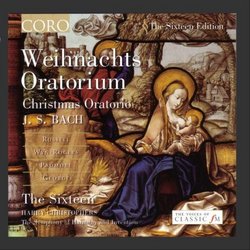Outstanding performance
Claude Greenmount | The Universe | 09/08/2006
(5 out of 5 stars)
"Harry Christopher and The Sixteen offer up a lively, energetic reading of Bach's (so-called) Christmas Oratorio, a work that should be heard more often in the USA than it is.
The performance of the first chorus of Cantata I, "Jauchzet, frohlocket," bursts with exuberance and energy, but is never rushed. The sopranos are especially to be commended for their performance; the writing requires them to go from the very bottom of their range to the top of it in short order. The opening phrase, set low in all voices, does not have a pushed, chest-voice quality that one usually hears in these opening bars. As the treble instruments pile one entrance on another in downward scales, the trumpets arpeggiate upward-- the excitement Bach meant to convey is readily apparent in this performance. And that's just the first movement.
Choices for tempi, phrasing, and voicing are very carefully made, yet the entire performance seems spontaneous, exuberant, youthful. Intonation is spot on and few if any technical flaws distract from the vitality of the performance.
For many years, I viewed the Christmas Oratorio as an interesting work, but not one I cared to know beyond my previous experiences, no doubt tainted by poorly prepared and executed performances. Would that this recording were my first exposure to this beautiful and exciting work! If you don't have a recording of this work, this is the recording to get to know it by. If you have one, this is a great addition to your collection."
Something missing!
Terry Serres | Minneapolis, MN United States | 12/18/2009
(2 out of 5 stars)
"There are a lot of wonderful recordings of this work out there. This is not one of them. Perhaps the most succinct review I could make of this recording and its merits is to state that I have twelve versions of this work -- I listen to it at all times of the year -- and this is one of just two that I just couldn't bear to keep in my collection.
This record is proof positive that elegance alone is not enough in a recording of the Christmas Oratorio. This reading offers elegance in spades. Missing is all the joy and mystery of the occasion.
The playing, if truth be told, is immaculate and often insightful. Tempi are all well-judged. The chorus is certainly well-rehearsed, every vocal line clean and well-articulated. But these virtues do not save the performance from utter tepidity.
The problems for me are pretty easy to pinpoint. (1) The choral parts are the most critical downfall. They have no flow, no rubato ... no soul. There is no bite -- the consonants are all but inaudible except in the most obvious places, we hear no connection to the language, to the meaning of the text. The result is mere sound. I have never been less moved by the big choruses, especially in the three trumpet-laced cantatas. (2) The sonic ambiance on this recording is woefully flat. (3) Two of the soloists just don't cut it. The bass, Michael George, is robust if a bit woolly; but he has enough finesse, insight, and personality to maintain interest. The tenor/evangelist, Mark Padmore, is wholly satisfying. It is a worthy performance and by far the main reason for giving this set a listen. However, the soprano lacks the purity of voice needed in this work; and the alto, while technically a fine singer, sounds perfunctory. The alto solos carry much of the emotional weight of the oratorio, they should impart wonder and mystery, and that dimension is entirely missing here. (4) The register used for the organ in some movements (try "Herrscher des Himmels") is peculiar, making an annoying buzz in the ear during what should be some of the most rousing moments. (5) The trumpet part, a major element in three of the cantatas, sounds phoned in. Like the chorus, the trumpets have no bite. They're almost in the background!
Some of these critiques will sound frivolous -- Does lack of consonants really call for two stars? In a way, the effects are cumulative Listen to the tenth track of beautifully articulated but quasi-wordless vocalizing and it's going to add up, you're going to feel a disconnect. I was nagged by discontent continuously while listening to this recording: Where are the trumpets? Why does the alto sound so uninvolved? Why does the organ sound like a Wurlitzer overtrack? Could we have a LITTLE atmosphere here? With all these afflictions plaguing the ear, one really does welcome the narrative portions delivered by the evangelist as a breath of fresh air.
Sorry to contradict the three other glowing reports offered here, but I have to go with what my ears and heart and long history with this work tell me. Aside from the remarkable achievement of tenor Mark Padmore, this is a profoundly lackluster recording of the Christmas Oratorio. There are any number of better recordings: My favorite remains Collegium Aureum and the Tölzer Knabenchor under Gerhard Schmidt-Gaden, from early in the early music movement (1972). This is a recording where even the idiosyncrasies and imperfections work: the bleating of the boy soloists, the blatting of the valveless trumpets, the deliberate tempi convey all the splendor of Bach's invention. Also ranking high is John Eliot Gardiner's account with a winning roster of soloists that includes Hans-Peter Blochwitz, Anne Sofie Von Otter, and Olaf Bär. If you want the level of elegance that Christophers and the Sixteen offer, without the soullessness, try Collegium Vocale Ghent under Herreweghe. For an emphatic account at often breakneck speeds that manages to retain the spirit of the work, you might check out the recording that came out with Capella Amsterdam conducted by Jan Willem de Vriend. I avoid the willful joylessness of Harnoncourt's two versions."


 Track Listings (36) - Disc #1
Track Listings (36) - Disc #1